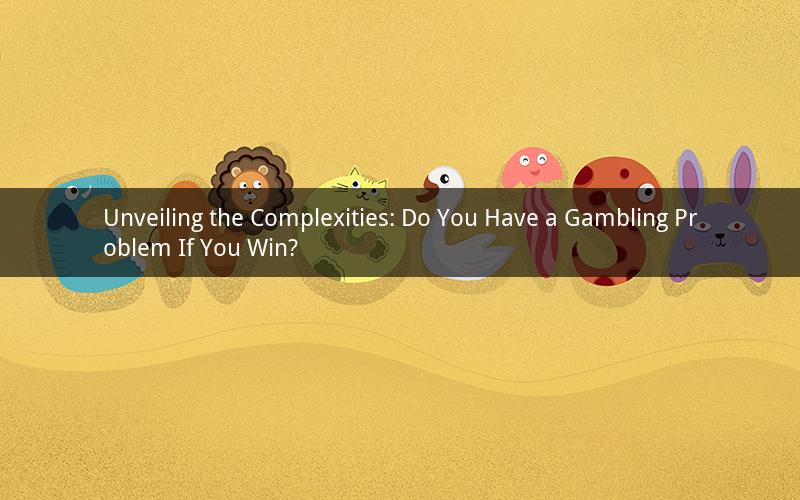
Introduction:
Gambling is a multifaceted activity that involves both luck and skill. It is a common misconception that winning in gambling signifies the absence of a gambling problem. However, the reality is far more intricate. This article delves into the complexities of gambling and explores whether winning can be an indication of a gambling problem.
1. Understanding Gambling:
Gambling is the act of wagering money or something of value on an event with an uncertain outcome. It can be found in various forms, such as casinos, sports betting, lottery, and online gambling. While many individuals engage in gambling for entertainment purposes, it is crucial to recognize the potential risks associated with it.
2. The Concept of a Gambling Problem:
A gambling problem, also known as problem gambling, refers to a pattern of gambling behavior that causes significant distress or harm to an individual. It is characterized by an inability to control gambling, preoccupation with gambling, and negative consequences in various aspects of life, including financial, emotional, and social.
3. The Myth of Winning as a Solution:
Contrary to popular belief, winning in gambling does not necessarily indicate the absence of a gambling problem. Winning can be a temporary relief or a false sense of security for individuals struggling with problem gambling. It is essential to understand the underlying factors that contribute to a gambling problem, regardless of the outcome.
4. Factors Contributing to a Gambling Problem:
a) Psychological Factors: Individuals with certain psychological traits, such as impulsivity, sensation-seeking, and a need for excitement, may be more susceptible to developing a gambling problem.
b) Social Factors: Peer influence, family dynamics, and exposure to gambling environments can contribute to the development of a gambling problem.
c) Environmental Factors: Easy access to gambling opportunities, advertising, and the availability of credit can exacerbate gambling problems.
5. The Role of Winning in Problem Gambling:
While winning can provide a temporary relief or reinforcement, it does not address the underlying issues contributing to a gambling problem. Winning can create a false sense of control, making individuals believe that they can continue gambling without any negative consequences. This belief can further entrench the problem and lead to increased gambling behavior.
6. Signs of a Gambling Problem:
a) Preoccupation with Gambling: Spending a significant amount of time thinking about gambling, planning for it, or reliving past gambling experiences.
b) Inability to Control Gambling: Persistent attempts to stop or reduce gambling but being unsuccessful.
c) Financial Consequences: Experiencing significant financial difficulties due to gambling, including debt, loss of savings, or financial stress.
d) Emotional and Social Consequences: Neglecting responsibilities, strained relationships, and experiencing feelings of guilt, shame, or depression.
e) Risky Behavior: Engaging in gambling activities that are beyond one's financial means or taking excessive risks.
7. Seeking Help:
If you suspect that you or someone you know has a gambling problem, it is crucial to seek help. Various resources and support systems are available to assist individuals in overcoming their gambling addiction. Professional help from therapists, counselors, or support groups can provide guidance and support during the recovery process.
8. Conclusion:
Winning in gambling does not guarantee the absence of a gambling problem. It is essential to recognize the complexities associated with gambling and understand the signs of a gambling problem. By seeking help and addressing the underlying factors, individuals can overcome their gambling addiction and lead a healthier, more fulfilling life.
Questions and Answers:
1. Q: Can winning be a sign of a gambling problem?
A: No, winning itself is not a definitive indicator of a gambling problem. However, it can create a false sense of security and exacerbate the problem if the underlying factors contributing to the gambling behavior are not addressed.
2. Q: Is it normal to feel excited or relieved after winning in gambling?
A: Yes, it is natural to feel excited or relieved after winning. However, if these emotions are accompanied by an inability to control gambling or negative consequences, it may be a sign of a gambling problem.
3. Q: Can winning help someone overcome a gambling problem?
A: No, winning alone cannot help someone overcome a gambling problem. Addressing the underlying factors and seeking professional help are crucial steps in overcoming a gambling addiction.
4. Q: Are there any long-term consequences of problem gambling?
A: Yes, problem gambling can have long-term consequences, including financial ruin, strained relationships, mental health issues, and legal problems. It is essential to address the problem promptly to mitigate these consequences.
5. Q: Can problem gambling be treated effectively?
A: Yes, problem gambling can be treated effectively. Professional help, support groups, therapy, and self-help strategies can assist individuals in overcoming their gambling addiction and leading a healthier life.